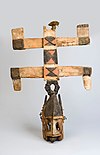Zulu traditional religion
| Part of a series on |
| Traditional African religions |
|---|
 |
Zulu traditional religion consists of the beliefs and spiritual practices of the Zulu people of southern Africa. It contains numerous deities commonly associated with animals or general classes of natural phenomena. Unkulunkulu is known to be the Supreme Creator.
Beliefs
The Creator and the ancestors
Similar to some other Bantu religions, Adherents of Zulu traditional religion believe in honoring ancestors (Amadlozi). Unkulunkulu is the highest god and is the creator of humanity.[1]
UmkhuluwoMkhulu ("the greatest one") was created in Uhlanga,[2] a huge swamp of reeds, before he came to Earth. Individuals base their morality or behavior ethics on his judgment or “apprehension of the Ultimate Reality.”
[3] Unkulunkulu is sometimes conflated with the sky god Umvelinqangi[4] (meaning "he who was in the very beginning"), the god of thunder, earthquake whose other name is Unsondo, and is the son of Unkulunkulu, the Father, and Nomkhubulwane, the Mother.[citation needed]
The word nomkhubulwane means the one who shapeshifts into any form of an animal. Another name given for the supreme being Umkhuluwomkhulu is uSomandla, the ultimate source of all existence. European settlers used the word Unkulunkulu in order to try to explain their belief in the God of the bible to the people of Zululand.[citation needed]
According to Irvin Hexham (1981), "there is no evidence of belief in a heavenly deity or sky god in Zulu religion before the advent of Europeans".[5] However, other scholars such as Eileen Jensen Krige, Isaac Schapera, Axel-Ivar Berglund (1976), Hammond-Took, and John Mbiti disagree with Hexham's analysis. They argue that the "lord of heaven" or Zulu sky god has always existed in the traditional Zulu belief system, a deity who they argue is greater than the "archetypal ancestor and creator, Unkulunkulu".[6]
Other deities
- Nomhoyi/Mamlambo, the goddess of rivers
- Nomkhubulwane/Mbaba Mwana Waresa, sometimes called the Zulu Demeter, who is a goddess of the rainbow, agriculture, rain and beer (which she invented)
- Inkosazana, another fertility goddess
- uNgungi, the deity of the blacksmiths
- iNyanga the Moon goddess is associated with healers who are called IziNyanga, the word nyanga is a Zulu word for the Moon
- Sonzwaphi the deity of healing
- Ukhulukhulwana (or UkhuluKhukwan) a star being ancestor who came from the stars and found the ancient Zulus living like animals and without laws. He taught them to build huts and taught them the high laws of isiNtu. The word unkulunkulu is suspected to be a corruption of the word umkhuluwomkhulu. [citation needed]
Text is available under the CC BY-SA 4.0 license; additional terms may apply.
Images, videos and audio are available under their respective licenses.

